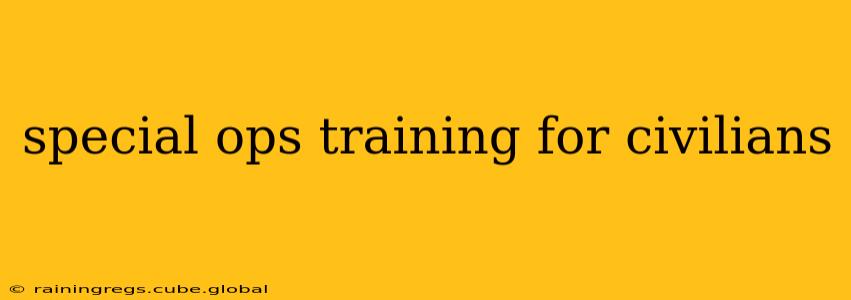The allure of Special Operations training is undeniable. Movies and video games portray elite soldiers undertaking daring missions, showcasing incredible physical and mental prowess. This naturally sparks curiosity among civilians, many of whom wonder: Can I access similar training? The answer is nuanced, and this guide will explore the realities and possibilities of civilian special ops training.
What Does "Special Ops Training" Actually Entail?
Before diving into specifics, it’s crucial to understand the breadth of special operations training. It's not a single program, but a complex system encompassing various skill sets and disciplines. Military special forces training is rigorous, demanding years of dedication, and designed to prepare individuals for high-stakes, life-or-death scenarios. Key components typically include:
- Physical Fitness: Exceptional endurance, strength, and agility are paramount. Expect grueling physical training regimes far exceeding standard military fitness standards.
- Combat Skills: Weapons handling, marksmanship, hand-to-hand combat, and tactical movement are all essential elements.
- Survival Skills: Navigation, evasion, survival in harsh environments, and medical self-sufficiency are crucial for operating in hostile territories.
- Teamwork and Leadership: Special forces operate in close-knit teams, requiring exceptional communication, trust, and leadership capabilities.
- Mental Fortitude: The ability to withstand immense physical and psychological pressure is a defining trait of special operators.
Can Civilians Access Special Ops-Style Training?
While you won't find a direct equivalent to a Navy SEAL or Green Beret training pipeline open to the public, various civilian programs offer elements of this intense preparation. These programs typically focus on specific aspects, rather than a holistic replication of military training.
What are the different types of civilian special ops training available?
1. Survival Schools: Numerous schools specialize in wilderness survival, including navigation, shelter building, fire starting, and water procurement. These are valuable skills applicable to many situations, not just special operations. Examples include schools offering courses in land navigation, wilderness first aid, and advanced survival techniques.
2. Combatives and Self-Defense Training: Civilian options abound for learning martial arts, hand-to-hand combat, and various self-defense techniques. These can range from traditional martial arts to specialized systems focused on close-quarters combat.
3. Shooting Schools and Ranges: Many professional shooting instructors offer advanced courses in marksmanship, weapons handling, and tactical shooting techniques. These courses can be tailored to different skill levels, from beginner to advanced.
4. Tactical Training Centers: Some private facilities offer courses focusing on tactical skills, teamwork, and problem-solving exercises, mirroring some aspects of special forces training. However, be cautious – the quality and legitimacy of such centers vary considerably.
What are the limitations of civilian special ops training?
It is crucial to understand that civilian programs, however rigorous, will never fully replicate the intensity, duration, or operational relevance of genuine military special operations training. Military training incorporates live-fire exercises, complex operational simulations, and prolonged periods of stress and deprivation that are simply not replicable or ethically justifiable in a civilian context.
Is civilian special ops training worth it?
The value of civilian special ops training hinges on individual goals and expectations. If the goal is to live vicariously through the experience of elite soldiers, the investment may be underwhelming. However, if the objective is to gain valuable skills in self-defense, survival, marksmanship, or leadership, then many of the available programs can be highly beneficial.
What about fitness and mental toughness training for civilians?
Many civilians aspire to the physical and mental fortitude of special operators. While mirroring their exact training is impossible, incorporating elements of their fitness regimes into your life can be incredibly beneficial. This could involve incorporating elements like calisthenics, endurance training, and high-intensity interval training (HIIT). For mental toughness, consider practices like mindfulness, meditation, and stress management techniques.
Where can I find reputable training programs?
Research is paramount. Look for instructors with verifiable credentials and experience, preferably within relevant fields like military, law enforcement, or professional security. Read reviews, check for certifications, and look for programs that prioritize safety and ethical conduct.
Ultimately, understanding the realities and limitations of civilian access to special operations training is key. While replicating the full experience is impossible, elements of it can be learned, leading to valuable self-improvement in fitness, skills, and mental resilience. Always approach such training with realism, respect for safety, and a clear understanding of your personal goals.
